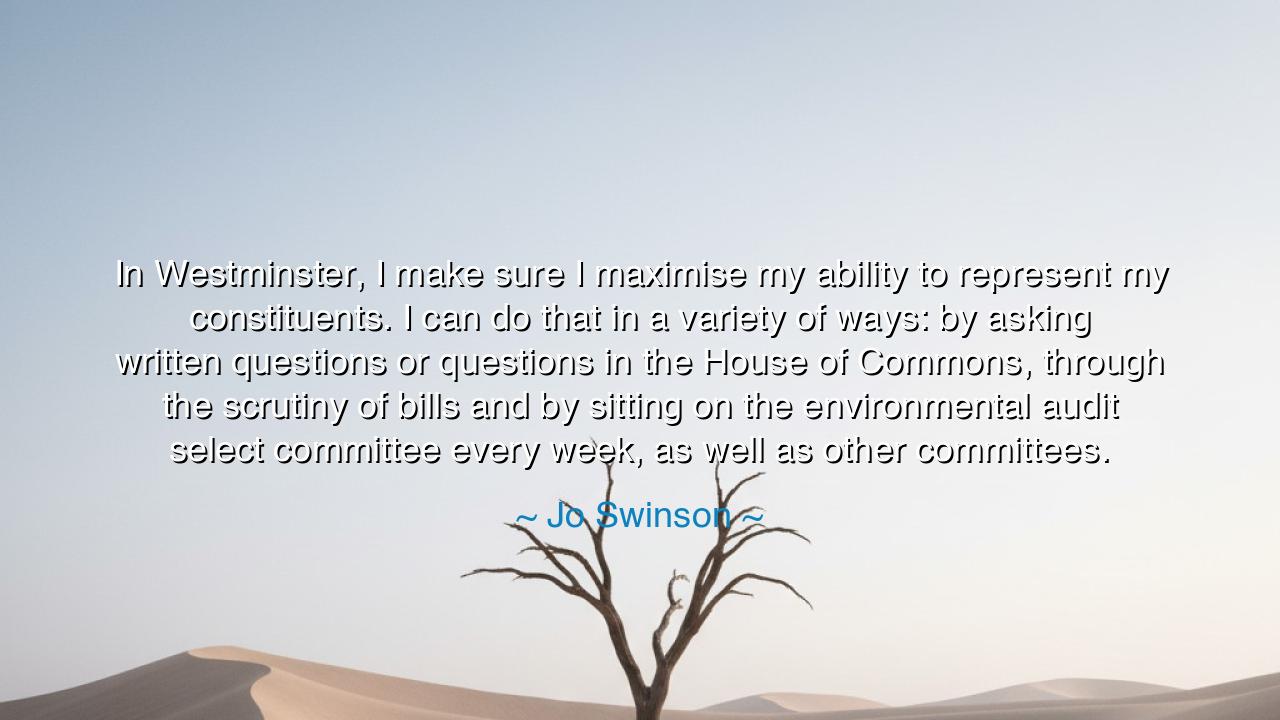
In Westminster, I make sure I maximise my ability to represent my
In Westminster, I make sure I maximise my ability to represent my constituents. I can do that in a variety of ways: by asking written questions or questions in the House of Commons, through the scrutiny of bills and by sitting on the environmental audit select committee every week, as well as other committees.






Hear, O children of democracy and keepers of the common good, the words of Jo Swinson: “In Westminster, I make sure I maximise my ability to represent my constituents. I can do that in a variety of ways: by asking written questions or questions in the House of Commons, through the scrutiny of bills and by sitting on the environmental audit select committee every week, as well as other committees.” These are not words of vanity, but of service; not the boast of one seeking power, but the testament of one who knows that power is only a tool when wielded for the people. For to be entrusted with representation is to bear a heavy burden, one that requires diligence, persistence, and humility.
The ancients understood this sacred duty. In Athens, the citizens gathered in the ekklesia, where voices rose not for themselves alone but for the city as a whole. The true leader was not he who shouted the loudest, but he who listened most carefully, and who carried the voice of the many into the council of the few. So too in Westminster, the halls of power are not meant to be chambers of personal ambition, but arenas where the constituents’ voices are carried, magnified, and translated into law. Swinson’s words remind us that representation is not symbolic—it is lived daily in questions, debates, and careful scrutiny.
Consider the story of William Wilberforce, who for decades labored in the House of Commons to end the slave trade. He did not simply make grand speeches; he used every means at his disposal—questions, committees, alliances, and bills. His persistence, year after year, ensured that the cries of the oppressed were never silenced. This mirrors the spirit in Swinson’s declaration: that true representation requires not only passion, but the patient and disciplined use of every tool of governance.
The origin of Swinson’s words lies in her role as a Member of Parliament, where she sought to show her people that their trust was not misplaced. By listing the many ways she served—through written questions, scrutiny of bills, and the environmental audit select committee—she revealed that democracy is not sustained by one grand gesture but by countless daily acts of diligence. Her testimony is both practical and profound: that representation is measured not by titles held, but by the tireless labor of service.
The deeper meaning of her statement is this: the health of a democracy depends upon constant vigilance. Laws must be examined with sharp eyes, committees must weigh the long-term welfare of the people and the environment, and questions must pierce the armor of authority. Without such scrutiny, the machinery of governance may run unchecked, serving the interests of the powerful instead of the people. The environmental audit select committee, in particular, symbolizes the duty of foresight—guarding not just today’s citizens but the generations yet unborn.
The lesson for future generations is clear: never take representation for granted. It is not enough to elect leaders; the people must also demand that those leaders labor tirelessly on their behalf. And for those who hold office, the path of honor is not in rhetoric alone, but in the unglamorous, persistent work of committees, questions, and scrutiny. A nation thrives when its leaders serve diligently in the details, just as a house stands strong not by its roof alone but by the strength of its foundation stones.
Practical action lies before us: as citizens, we must watch closely the work of our representatives. Ask not only what they say, but what they do. Do they attend to committees? Do they ask the hard questions? Do they scrutinize laws that may shape our lives and our children’s futures? And if you are called to serve, follow Swinson’s example: maximize every opportunity to lift up the voices of those who entrusted you with power.
So let it be remembered: the greatness of representation lies not in the grandeur of speeches, but in the scrutiny of bills, the persistence of questions, and the patient work of committees. In these daily labors, the covenant of democracy is upheld, and the people’s voice becomes the people’s law. Choose, then, to serve with diligence, and future generations will honor your name.






AAdministratorAdministrator
Welcome, honored guests. Please leave a comment, we will respond soon